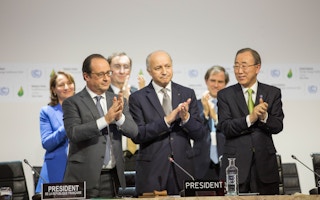After two decades of tough negotiations, governments across the world on 12 December signed a historic global climate change treaty, potentially signaling the end of the fossil fuel era.
To continue reading, subscribe to Eco‑Business.
There's something for everyone. We offer a range of subscription plans.
- Access our stories and receive our Insights Weekly newsletter with the free EB Member plan.
- Unlock unlimited access to our content and archive with EB Circle.
- Publish your content with EB Premium.
The Paris Agreement, as it is called, has sent the business community a clear signal and provided the long-term political certainty required to unlock trillions of dollars in low-carbon investments, said business leaders on Saturday.
Under the treaty, countries will stop adding greenhouse gas emissions to the atmosphere before the end of century, review their emission reduction targets every five years, and raise funding of at least US$100 billion a year - called the Green Climate Fund - to help developing countries cope with climate change.
Singapore’s Foreign Minister Vivian Balakrishan said in Paris - hours after the text was formally adopted by the United Nations - that many businesses want to “do the right thing”, but they were “hoping for a clear signal at a multi-lateral level” that their investments in doing so would pay off.
This text - with its global, legally-binding agreement and a transparent method of tracking promises made by countries - provides the assurance that the political will is real, and will be consistently applied across the globe, he said.
Edward Cameron, managing director of partnership and research at non-profit Business for Social Responsibility said companies now have the confidence that governments will support low-carbon projects well into the future.
The agreement has effectively created a whole new market for solutions such as renewable power, energy efficiency, sustainable agriculture and land use management solutions, among others, Cameron added.
These national plans, known as Intended Nationally Determined Contributions (INDCs), will help “unlock the trillions” in private sector financing for sustainable development, he noted.
Even though the agreement did not explicitly include a carbon price, Cameron said that many jurisdictions, including China, have already begun to implement carbon markets, which will effectively tax pollution.
Paul Polman, chief executive officer of consumer goods giant Unilever, said in a statement just after news broke of the successful adoption of the Paris Agreement: “The consequences of this agreement will be felt in banks, stock exchanges, board rooms and research centres as the world absorbs the fact that we are embarking on an unprecedented project to de-carbonise the global economy.”
“
Across the world, the agreement shows that the age of high carbon is ending and a low-carbon era is emerging.
Edward Cameron, managing director of partnership and research, Business for Social Responsibility
In Asia, particularly, the agreement will have significant impact, said Sandrine Dixson-Decleve, director of the Cambridge Institute for Sustainability Leadership’s European Union Office.
This is because the rapidly-developing region is ripe for the mass adoption of low-carbon technologies and is well-positioned to take advantage of the Green Climate Fund promised to help developing countries tackle climate change.
“China is already racing ahead in clean technology investments”, she noted.
BSR’s Cameron acknowledged that the region will face challenges to implement their pledges, as “many companies still struggle with corruption, a lack of electricity grid infrastructure to support the scaling up of renewables, and other local challenges.”
But this is why business must work with governments to unlock challenges and barriers, he added.
More importantly, the universal nature of the Paris Agreement sends a strong message to multinational corporations that no matter which country they operate in, the government will enforce laws on emissions reductions.
“Now, you can’t threaten to leave one country for another that has more lax regulations,” he added.
He said MNCs now have an added impetus to finance green infrastructure and support local efforts to build knowledge and capacity on sustainable business.
“Across the world, the agreement shows that the age of high carbon is ending and a low-carbon era is emerging”, he said.
Lise Kingo, executive director of the UN Global Compact - the UN initiative for sustainable and responsible business - added that “the Paris Agreement sends the right market signals which will provide predictability, unlock capital, drive innovation and reward responsible business.”
“It is no longer a question of if we transition to a low carbon economy. Rather, it is a question of how,” she added.
This story was originally published on Future Ready Singapore. Sign up here to receive their newsletter.








